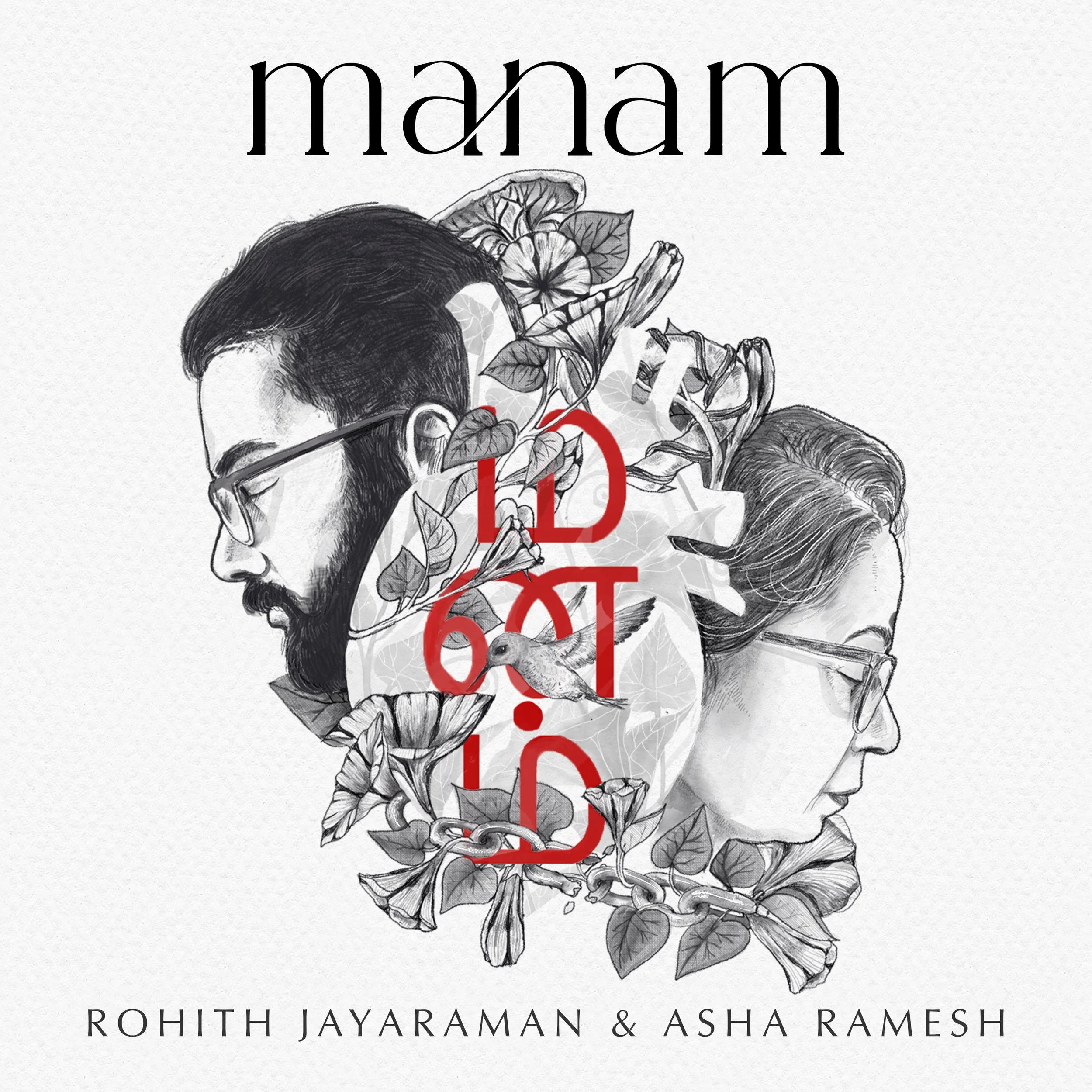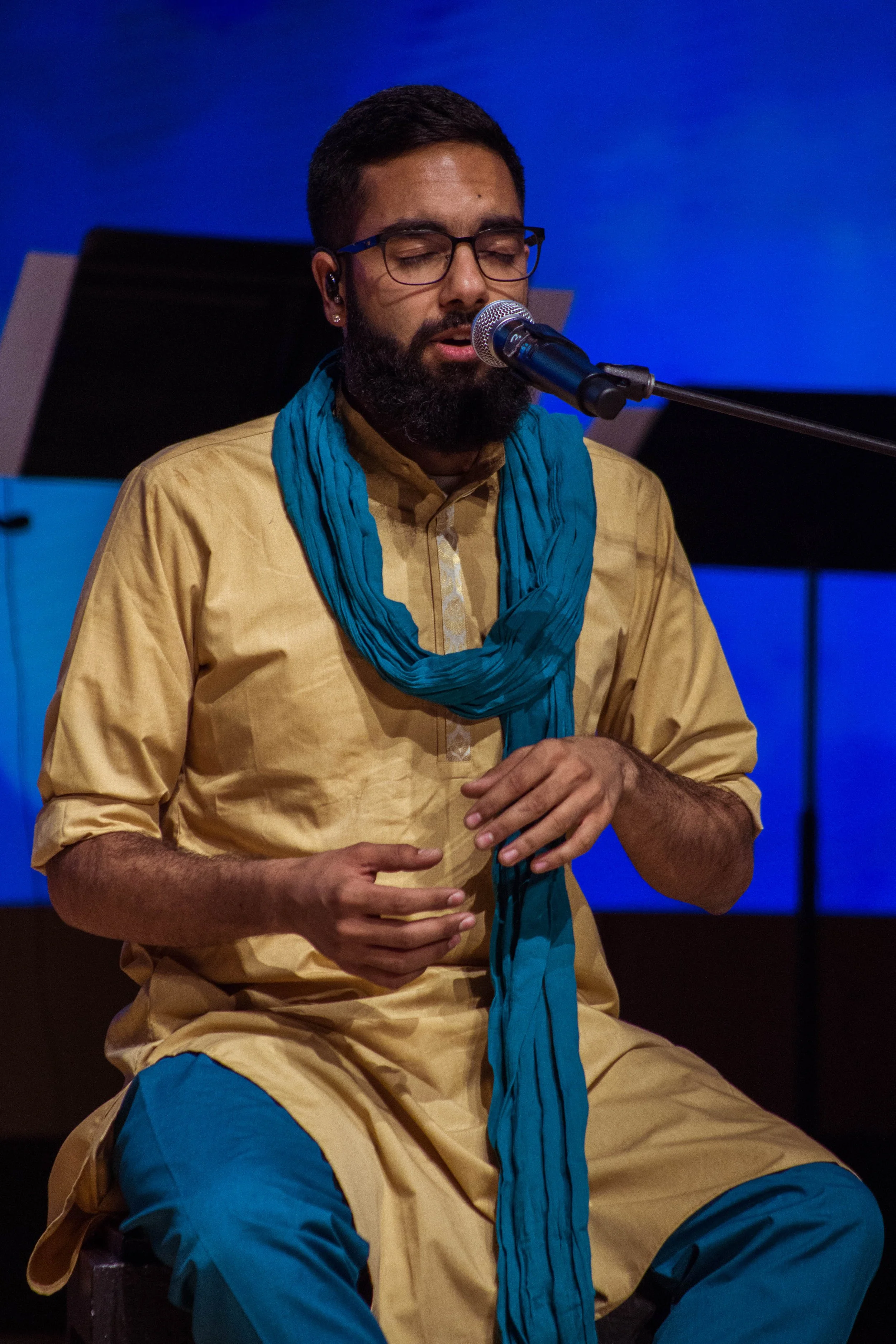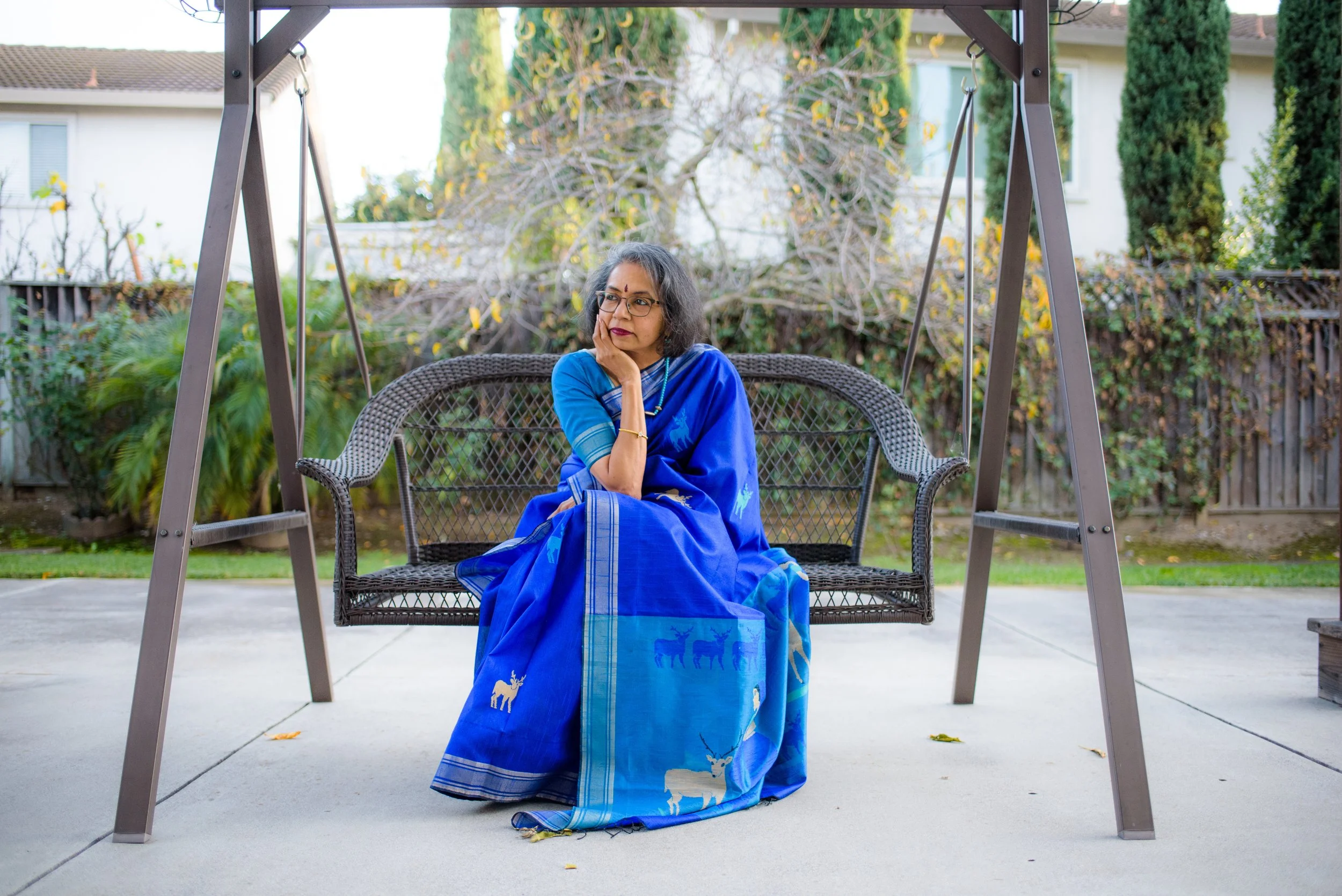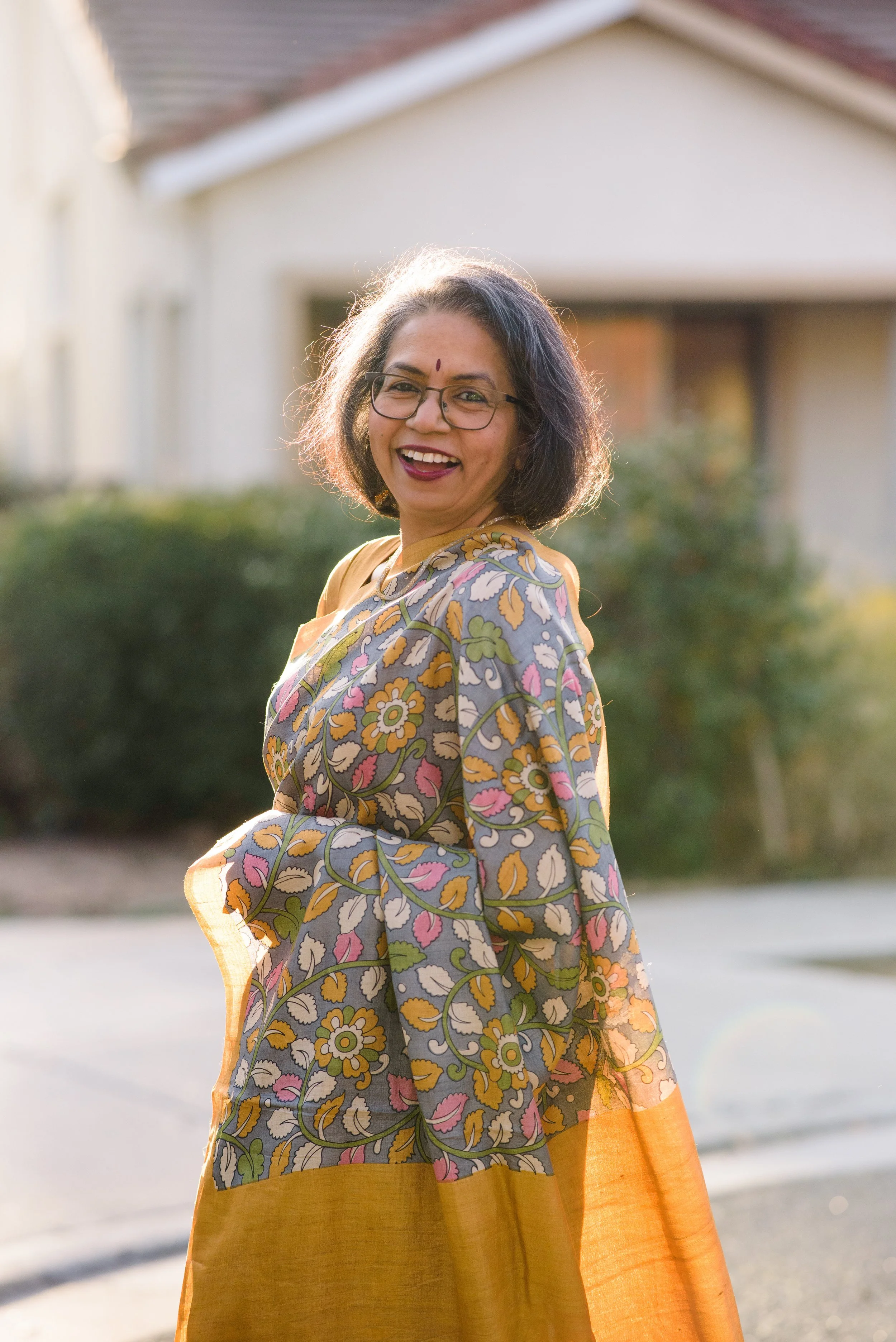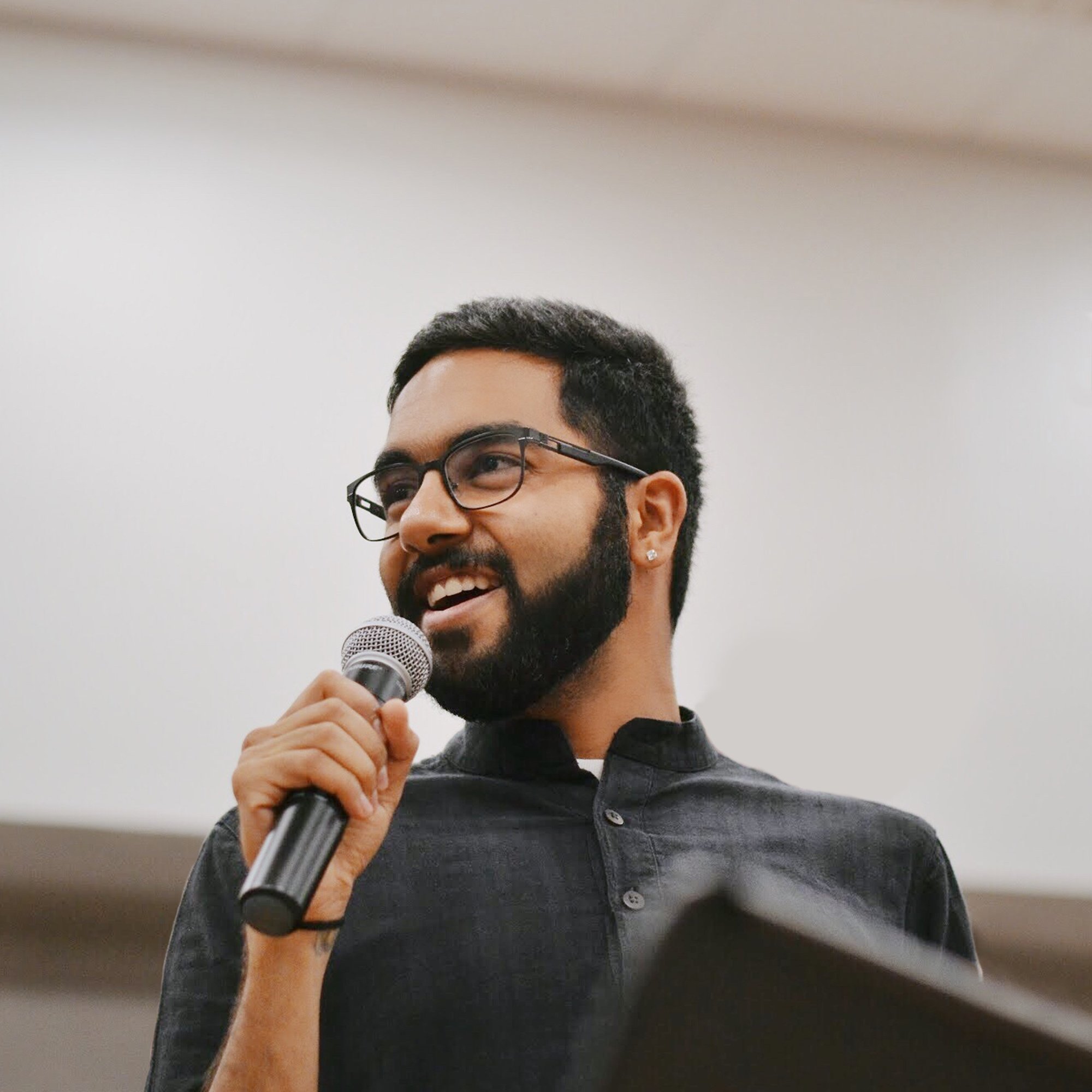Rohit Jayaraman & Asha Ramesh
by Mister Mime
15th October 2021
“Nothing is too precious, yet everything is precious.”
‘Manam’ is a musical opus by the mother & son duo of Asha Ramesh & Rohith Jayaraman in which they explore the topographies of their own hearts to recognize and express their innermost reflections on some fundamental issues of society pertaining to colour, caste, religion and public opinion.
Strongly guided by their Carnatic roots, they venture boldly into the stylistic realms of spoken word, jazz, rock and more in between. What stands out most about the album, above even the majestic musical virtuosity and honesty of the message, is that it evokes a clear and positively hopeful image of what we can make of ourselves and hence the world around us, if we invoke our inner strength and humanity and focus on the process of growing, adapting and marching forward in life. Thus, it serves as a perfect reminder to us all to retain and nurture our human-ness in a fast-expanding and ever-evolving world, and furthermore, to be at the forefront of this evolution.
MM: What does Manam mean?
AR: The word itself means "from the heart". The root word of 'Manam' is 'Mann'. 'Manam is the Sanskritized version, which is also used in the Tamil language.
MM: Would like to speak about the titles of the tracks and how they came about?
RJ: Well I've always been guilty of, as my dad says, wanting to paint the house before I've built it. I like the presentation aspect of things, and thinking about the end result. Given a choice, I would write all the track names, make the album artwork, and do all of that before I actually write any music. There's a little kid in me who gets excited about even the thought of releasing music. With this one though, we didn't think about it that way. We just wrote the songs, and after they were done we were thinking about what we should call it.
For both, 'Vetri Nadai' and 'Vidudhalai', you hear their respective titles in the last lines. Vidudhalai is such a strong word and has weight just by virtue of the language. So it felt like there was no other possible title but this.
It was quite similar to 'Vetri Nadai'. It essentially means "Victory path" or "Victory Walk". At first, I felt like "Vetri Nadai" was a strong thing to say, a strong statement to make at the start of the album. But after all, it felt right. There's also another song by the same name, probably from some Tamil film, that is a very traditional and triumphant song. However, once I separated myself from all that and looked at what is the internal compass of the song, then it felt right.
AR: The way the song grows from the first line till the end; the process of being successful at whatever is in your mind: that's what it symbolizes. It's not about a pompous kind of victory, rather about the process of how to change yourself, grow, adapt and march forward in life.
RJ: The album title was a bit of a struggle...we were googling a lot of words. We were not keen on calling it Vidudhalai..that would be too cliched and it was not the point of the experience anyway. We had about 17-18 options and eventually came across 'Manam'. Apart from the meaning of the word, it was also a palindrome, looked especially nice in lower case and we liked the aesthetic of the written word itself. We thought it would roll off the tongue of most people gracefully. Sometimes you've got to just let things happen in order to arrive at the most favourable outcome.
AR: Overall, Manam made sense because the album is all about what we were talking about from our hearts.
RJ: Though the album isn't about having any answers or knowing things, rather just about asking some questions and sharing our thoughts out loud. Even though we tried our best to keep things simple and not project any such vibe, we've still got quite a defensive and academic response from many people, as if we've made a TED talk. We only asked the most basic questions, and used simple analogies; at least in our minds, nothing is really "new" or even really profound. It's all stuff that people are talking about quite regularly, perhaps a bit densely packed together. Once you put something out, it's no longer just yours anyway. It becomes its own entity.
My partner (Vasu), who also produced 'Saloni' on the album - her Daadi recited the first two lines of the song. Her Daadi is very religious and spends a lot of her day reading the Gita, other scriptures, and constantly learning. She is super inspirational. When we talked to her about these topics, she got the line of the song that was about Rama and Shiva. So Vasu sat down and spoke with her about it, asked questions and they had a very open discussion. And I thought it was really awesome that at her age, being someone who does not need to engage in these sorts of discussions, she still chose to talk about it and answer all the tough questions put forth to her. She was totally involved, happy and even emotional about it.
As humans, we aren't monoliths, right? We will change, and if we don't then there's probably something wrong.
AR: For 'Saloni', a lot of personal experiences were brewing inside me as a South Indian growing up in Bihar. The first distinction is that all North Indians are fair and all South Indians are not. And I would always ask my mother why during Durga Puja, Durga is always depicted to be fair, but Kali the fierce, violent and in my mind, the stronger deity is dark. We also use the term 'black beauty' but on the other hand, when it comes to human beings, especially women, it is such a normal discussion to talk about their skin colour and superiority of fair skin.
When I was growing up, we were 4 sisters at home with a wide range of complexions. But our relatives couldn't stop discussing our differences and judging us. This has been a problem I faced till as recently as 3-4 years ago, so I wanted to write about it. And one afternoon, last July I sat down, wrote it and shoed it to Rohith, Vasu and my husband. For Rohith and my husband Ramesh, I had to explain it to them because of the Hindi language, but Vasu caught it right away and told me that it was beautiful, and something that all of us face, every day and across all ages. And that's how the idea came to be - it's been there for decades, but I finally felt like it was high time that I put it out. I got motivated by all the other songs we wrote. It is as important an issue as anything else. The best part was that non-Hindi-speaking people related to that song.
MM: Can you tell. us about the lyrics & the songwriting process?
AR: The lyrics are somewhere between written and spoken Tamil, and leaning toward spoken Tamil. For me, when I read or listen to lyrics, I would like to understand them quickly. I shouldn't require a dictionary to understand what I'm reading. Complicated words and phrases, like often found in Tamil poetry usually deter me from getting into it. So when I compose Thillanas, I keep the lyrics simple so that I'm able to express myself and the listener doesn't have to strain or struggle to understand. Just like a direct conversation. This has always been my way of writing.
RJ: I read and write Tamil, albeit slowly. It's a practice thing. When I am in Chennai, I read billboards, signs on the street. I speak it fine though. These days I speak to my grandmother on the phone once every couple of days, and that helps me keep in touch with the language.
AR: For the song 'Thillana', the lyrics were already written. I had sat down and dabbled one day and put them down. It was already about 70% ready by the time Rohith came back home for the lockdown. It just had to be placed into a melody and tweaked around a bit here and there. The message was very simple, and something that I always tell my children - Be a good human being.
MM: About the very special aspect of the record being a mother & son collaboration: It must take a special bond between you both to be able to create something like this!
RJ: Our family has always been very casual at home. I know a lot of my friends who have very different home environments. Whereas in our house, it's always been like this: if there's something you want to talk about or ask, whatever it may be, communication is always encouraged. There's no taboo topic. So we've always been a communicative household, and depending on the combination of people talking, it's either a quiet chat or a loud discussion. So all the topics and issues that led us to make the album were talked about in the very same fashion. Mum had written a few lines after the George Floyd incident, and the highlight of that was colour, caste, religion. I was learning a lot about caste at the time, and I've also gone through a full emotional journey with religion when I was younger. So, I had a strong response to each of those words she had written about colour caste and religion.
On the website, we listed a diverse range of influences and inspirational sources for people who may want to explore a particular avenue of the subject matter in the album.
MM: Can you speak about your musical background, connection with Tamil culture and broadening the horizons of Carnatic music?
AR: When I teach or perform music, I never restrict myself to any particular style or genre. While I performed Carnatic classical music, I would still go and perform Bhajans, Ghazals, film songs, etc. which my Guru never approved. Then I started singing for dance recitals which were again frowned upon. I was always curious about doing different things. Even during high school in Chennai, I had a small band and we would perform in competitions, songs by artists like Simon & Garfunkel. So that was my share of trying out various things. And when I started teaching, I would always encourage my students to listen to all kinds of music. I always told them: Art is everywhere, so don't restrict yourself. Have a grounding and foundation in one system and then explore other things. And that's exactly what I told Rohith as well.
When I look at the album, I feel like we have included certain traditional forms from the Carnatic music system like Viruttam singing which is not set to a rhythmic structure, which is what 'Vetri Nadai' starts off with. It's a free flow. And Viruttam is a very important musical form that exists in the performance of a true Carnatic concert.
There is the rhythmic structure where we have not taken a straightforward 8-beat cycle, but instead a Mishram (7) for Vidudhalai - which is considered to be an intricate cycle.
Thillana is a very popular musical form in vocal and dance performance. So it is as Carnatic as it gets, but we are making it more approachable.
I feel like Carnatic music for some reason has been put upon this pedestal and made so unapproachable that it scares people away. Even between Carnatic and Hindustani music, we have put it under a lock and key and we aren't giving away, just taking. Hence you don't see a Hindustani musician singing a Kannada bhajan or a Thyagaraja Kriti - because we have made ourselves unapproachable.
Having grown up in the East, I feel so bad that we take from other cultures but we don't want to give what we have.
Diversity, in language or otherwise, can be a barrier, or a possibility to expand our horizons.
RJ: I feel that they are all just 'genres', to use the term liberally. But if you call Carnatic music a genre, people get upset. But it's really just another form of music creation. But we imbue it with so much weight, purity and 'divinity' that you don't let it grow. You then tend to approach it with almost a sense of fear, like you're destroying the tradition. There's so much of this sentiment attached to it. But at the end of the day, you're learning something that's new and awesome - which is still music! People say that if you learn Carnatic music you can sing and play anything in the world...that's not true!
Writing content that reflects what we see in the world was something that we tried to do. It instantly makes part of the world we live in, rather than some ancient tradition.
For me, the album is like a trajectory of my musical journey thus far.
I started singing right here in this house in '99 when I was 5. So the album is also like a mini-full circle - a culmination of our musical journey together as well
MM: Do you have any final thoughts or reflections on your journey so far?
RJ: Nothing is too precious, yet everything is precious. I have been trying to live this way for the past couple of years. I know that Carnatic music is what it is, along with its merits as well as all the cultural baggage that comes with it, and of course my personal baggage within the music. But somebody else probably feels the same about their music, and it's all very contextual. And if I can learn things from other people, that's the coolest thing for me. So that's where I'm at right now. I'm trying to learn about music from the Middle East, from Africa, a little jazz from my friends, and right now I'm learning about Gnawa music. All of these are so rich with...pure awesomeness! And they did it before and brought it to a certain place. And you can take that and hopefully take it to the next point. That's all it is, expansion.
AR: In my personal experience and journey, I've learnt so much and in the last few years I have felt comfortable doing things differently or not doing certain things also. It took a bit of courage and maturity on my part to be comfortable with who I am, what I want to do and not have to prove anything to anybody. So this growth has been there for me in the last few years and I am very proud of where I am right now. This album has really opened up a lot for me. I've learnt so much, been exposed to so much and I've felt comfortable in telling the world that this is who I am.
So my advice, or rather takeaways from all this is: first of all there should be clarity in what you feel and what you want to express, which requires clarity in your own thoughts. And you can choose the medium of expression, whether it is writing, dance, singing, anything. You can do what you like, and don't hold back, or think about what people will say. Communication is important. Everybody is not going to agree with you and you don't have to agree with everybody on everything, but make sure that you are resonating with what you want to express or perform. You don't have to do everything; just do what relates to you and do it well. That's when you enjoy yourself. Lastly, always keep your mind open. It's a big world now. So our thoughts have to be global.
Technology is also going forward at such a fast pace, but we shouldn't lose the human-ness in ourselves.
You Can Follow Rohith Jayaraman & Asha Ramesh on:
All Images Courtesy of Rohith Jayaraman & Asha Ramesh
